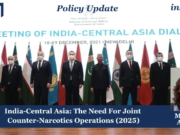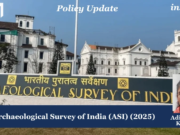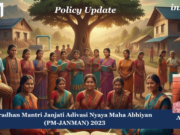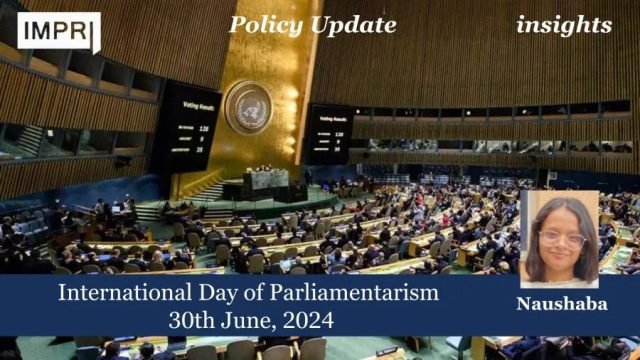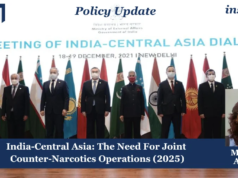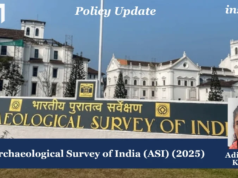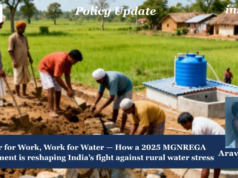Policy Update
Naushaba
Background
Every year on June 30, Our world celebrates the International Day of Parliamentarism, also known as World Parliament Day. On this day in 1889, the Inter-Parliamentary Union (IPU) was established by a small group of parliamentarians who believed that parliamentary dialogue and diplomacy are essential to settling differences rather than going on to war, 135 years later, nearly every country in the world has some form of parliament, accounting to a total of 190 today.
Later in 2018, through a United Nations General Assembly Resolution led by the Inter-Parliamentary Union, the International Day of Parliamentarism was officially operationalised. The year 2024 marks the anniversary of this indefatigable vision for parliamentary diplomacy as a better way to settle differences than war. Especially, during this critical time when the world is witnessing two different wars in the face of humanity. When people are losing their trust in political institutions and democracy is itself at the perils of populist and rightist movements.
Functioning
Inter-Parliamentary Union is responsible for organising the International Day of Parliamentarism every year on June 30ṭh. Headquartered in Geneva, Switzerland, the theme of the 2024 International Day of Parliamentarism is “Parliamentary Diplomacy: Building Bridges for Peace and Understanding” to reconfirm the commitment towards inter-parliamentary dialogue and cooperation, and to put emphasis on the IPU’s unique role as the parliamentary counterpart to the United Nations.
The IPU is the parliament of parliaments, a visualisation of Kant’s idea of a federation of free states and Perpetual Peace. Membership of IPU comprises 180 national parliaments around the world with some 44,000 members of parliament and 15 Associate Members. IPU provides a conducive platform for parliamentarians of different countries to engage in dialogue, share their best practices, and collaborate on issues of common interest.
The Assembly of IPU, the principal statutory body meets twice a year to formulate policies according to its agenda. IPU works on the vision of ‘We want a world where every voice counts, where democracy and parliaments are at the service of the people for peace and development.’ The 2024 Geneva Declaration on Parliamentary Diplomacy: Building Bridges for Peace and Understanding was released before the commemoration of the World Parliamentary. The declaration called for an immediate ceasefire in Gaza and highlighted the importance of addressing global challenges through multilateral parliamentary actions.
IPU closely works in collaboration with various UN agencies as well as the parliaments of its member countries by enforcing its resolutions and recommendations. It organises meetings and IPU Members also have a dedicated Committee on Democracy and Human Rights that meets at every Assembly.
Performance
In the year 2022, IPU released ‘The IPU 2022-2026 Strategy’ which was one of its broadest and most inclusive consultations in more than thirteen decades of its existence. The strategy coincides with five significant trends that will continue to shape the global agenda over the coming five years:
- The need for immediate action on the global existential threat of climate change.
- Growing social and economic inequalities including an increasing digital divide, further exacerbated by the ongoing COVID-19 pandemic.
- Weakening public trust in national and global institutions of governance and increasing threats to parliaments and their ability to serve their constituents effectively.
- Regression on key democratic, human rights and development achievements.
- Growing threats to peace and security and people’s yearning for a more peaceful and secure world.
IPU has worked closely with various collaborators to meet its four policy areas effectively these are:
- Climate change (CC)
- Democracy, human rights, gender equality and youth participation
- Peace and security
- Sustainable development for all.
For CC, IPU has helped parliaments across the world to make progress on the Paris Agreement and decarbonise parliaments themselves through various research tools and meetings. It has been working closely with the UN partners on climate change, especially the United Nations Climate Change Conference held in the framework of the United Nations Framework Convention on Climate Change. It is an essential partner of the London School of Economics database of climate change legislation. Simultaneously, IPU is also working with UN, Interpeace, Parliamentarians for Nuclear Non-proliferation and Disarmament (PNND) and other organisations that share our commitment to peace.
To help parliaments across the world become more representative gender-balanced, younger, transparent, accessible, accountable and effective, IPU has been pooling the collective expertise and experiences of its members to establish common standards and guidelines on parliaments..It has established the Centre for Innovation in Parliament to help parliaments harness the power of emerging technology. It also has the authority to release a monthly ranking of women in parliament. It has published regional reports on sexism and gender-based violence in parliament in 2016, 2016 and 2021. It further partners with international IDEA and Stockholm University in running a global database on gender electoral quotas.
Impact
IPU won the Nobel peace prize in 1901 for its efforts in promoting peace and cooperation among parliaments worldwide. Since then IPU has been working with the same energy to facilitate parliamentary diplomacy and empower parliaments and parliamentarians to promote peace, democracy and sustainable development around the world. It has collaborated with various UN agencies and NGOs to help parliaments of the world address the issues of climate change and adopt practices to mitigate. It works closely with parliaments to help implement resolution 1325 to make parliaments and the world more inclusive and safe for women.
IPU released its self assessment SDG toolkit with the help of the United Nations Development Programme which has proven successful to this day. The toolkit helps these parliamentarians in identifying good practices, opportunities and lessons learned on how to institutionalise and mainstream the SDGs into their legislative process, making countries more sustainable. In addition to initiatives on climate change and gender, IPU in 2018 became the first international organisation to introduce incentives to encourage more young parliamentarians to attend its meetings.
Although IPU has worked effortlessly via its meetings, reports and collaborative practices, it has failed at actually creating an impact. IPU has limited enforcement power to implement its resolutions and recommendations across all its participatory parliaments as it works on voluntary compliance of its member parliaments. IPU also has resource constraints: The effectiveness of the IPU is also hampered by limited financial and human resources as the amount that members contribute are based on their capacity to pay which is directly patterned according to UN criteria.
Another major hurdle which hinders the impactfulness of IPU is its diverse membership. This diverse membership represents a wide range of political systems and interests which complicates the process of decision making. This has made the meetings more challenging in reaching out for consensus on critical issues. Furthermore, as it is with many international organisations, IPU is also bogged down by bureaucratic processes of slow decision-making and implementation despite its efforts to overcome it.
Emerging Issues
Parliaments are the cornerstone for the proper functioning of democracy and for democracy to thrive, parliaments need to be strong, transparent, accountable and representative. The 16.7 SDG of the UN calls for ‘responsive, inclusive, participatory and representative decision-making at all levels’ and IPU is working towards the same aim of facilitating parliamentary diplomacy and empowering parliaments and parliamentarians to promote peace, democracy and sustainable development around the world. Despite serious efforts, there are some of the emerging issues within IPU:
- IPU lacks enforcement power as its enforcement hinges upon voluntary compliance by member states.
- Diversified members and their diversifying interests
- Issue of consensus-making
- Slow bureaucratic process leading to slow decision-making and implementation
The scope and area of IPU have widened over the years as issues and complexity in the world are ever-growing. IPU mainly works as a discussion forum, it does not have any authority to enforce its regulations on member parliaments. It has collaborated with various agencies to help in implementing resolutions for mitigating CC, promoting gender equality, motivating youth participation in parliaments and maintaining peace and security. sought to review. Though much of their work is focused on creating reports and working with other agencies to help implement its agenda.
However, the IPU strategy of agenda setting is essential for norm creation towards a better world. To further empower the workings of IPU, more focus should be on strengthening its enforcement mechanisms by developing efficient ways to ensure compliance with IPU resolutions and recommendations. Better enforcement mechanisms of IPU will help create a peaceful and democratic world with respect for human rights, gender equality, youth empowerment and sustainable development through political dialogue, cooperation and parliamentary action.
Additionally, efforts should be made towards streamlining the Bureaucratic processes by simplifying administrative processes so as to speed up decision-making and timely implemeting the resolutions. LPE can enhance communication, transparency, and efficiency by Leveraging technology as the more complex the world is better technologies are coming up for efficient and swift working.
Way Forward
The International Day of Parliamentarism is celebrated every on June 30 to commemorate the establishment of the Inter-Parliamentary Union. IPU is covertly a world parliament that aims to promote democratic governance and values. It works with parliaments and parliamentarians across the world to articulate resolutions and respond to the needs and aspirations of the people. IPE works for peace, democracy, human rights, gender equality, youth empowerment, climate action and sustainable development through political dialogue, cooperation and parliamentary action.
On this day, the union reviews the progress that parliaments have made over the years in achieving key goals of IPU. It seeks member parliaments to be more representative and move with the times, including carrying out self-assessments, working to include more women and young MPs, and adapting to new technologies for a better world.
Although the working of IPU has been hindered by a lot of factors including its inability to enforce resolutions, slow bureaucratic process and others, IPU has been working towards filling up its drawbacks. It has widened its scope to include climate change to gender and youth empowerment and their participation in parliaments across the world. It has pledged to do the utmost, individually and collectively, to protect and promote peace for all
References
Global Parliamentary Report 2022. (2022). In Inter-Parliamentary Union. Retrieved June 24, 26 C.E., from https://www.ipu.org/resources/publications/reports/2022-03/global-parliamentary-report-2022
Strategy 2022-2026. (2022). In Inter-Parliamentary Union. Retrieved June 24, 27 C.E., from https://www.ipu.org/resources/publications/about-ipu/2022-01/strategy-2022-2026
Geneva declaration: Parliamentary diplomacy: building bridges for peace and understanding. (2024). In Inter-Parliamentary Union. Retrieved June 24, 28 C.E., from https://www.ipu.org/sites/default/files/148-Geneva-Declaration-e.pdf
Budget and finance. (2024). In Inter-Parliamentary Union. Retrieved June 24, 28 C.E., from https://www.ipu.org/about-ipu/budget-and-finance
About the Contributor: Naushaba (she/her/hers) is a research intern at the Impact and Policy Research Institute and a postgraduate student of the Academy of International Studies, Jamia Millia Islamia. Her research interests lie in Gender Studies, Global Politics, Climate Change and Sustainable Development.
Acknowledgment: The author would like to express sincere gratitude to Dr. Arjun Kumar, Ms Aashnaa, Ms Aasthaba Jadeja and Ms Lakshita for their invaluable contributions into this article.
Read more at IMPRI:


